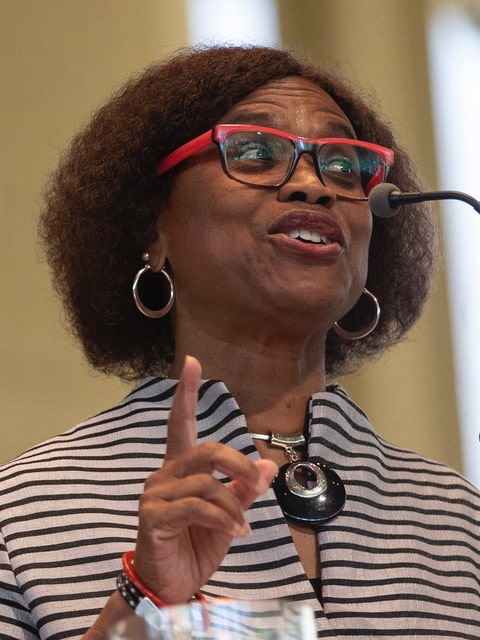For three weeks in October, Catholics from around the world came to Rome for the General Assembly of the Synod of Bishops to discuss a range of topics confronting the present-day Church as it prepares to govern itself in the future. Among the many Catholics was Marianne Duddy-Burke, executive director of DignityUSA since 2007.
DignityUSA is the world’s oldest organization of LGBTQIA+ Catholics. Since 1969, the organization has advocated for change in the Roman Catholic Church.
Duddy-Burke traveled to Rome with members from the Global Network of Rainbow Catholics, founded in Rome in October 2015 by more than twenty LGBTQ+ communities worldwide, including DignityUSA. Pope Francis met with the leaders of both groups. Duddy-Burke granted me an interview.
When we spoke in October, you’d just returned home from Rome. You, unlike many, had the coveted opportunity to speak with the Pope. What was it like to meet Pope Francis?
Having the Pope meet with leaders of the Global Network of Rainbow Catholics, a group of Queer Catholic organizations on six continents, marked a new moment for our movement. His encouragement of our work, pressing for decriminalization of LGBTIQ+ people and for a more inclusive and supportive church, has heartened us. For organizations like DignityUSA, officially considered a dissenting organization and banned from Catholic spaces, having a personal encounter with the Pope is truly miraculous.
What were your thoughts on traveling to Rome?
I went to Rome with my DignityUSA colleague Sam Albano with the goal of making LGBTIQA+ people visible to Synod Delegates, since there were no openly LGBTIQA+ people among the Synod Delegates. We also wanted to be among the Catholics who gathered in Rome, the seat of our Church, to remind everyone that the Church is so much larger than the folks assembled in that meeting room.
The acronym ‘LGBT’ was never used. What are your thoughts about that?
The erasure of LGBTIQ people from the Synod process by failing to name us in the report is sobering. That signals a devaluing of our lives and our place in the Church, and demonstrates how very important it is for LGBTIQ people, in Eastern Europe, in Africa, in the Caribbean, in every place where church leaders are not honoring our dignity and human rights to keep telling their stories.
Moving away from the Synod, in November, the Dicastery for the Doctrine of the Faith (formerly the Congregation for the Doctrine of the Faith) declared that some transgender people, including those who have undergone medical gender affirmation, can be baptized if the baptism of a transgender person is not likely to cause “scandal.” What do you think of this depiction of LGBTQ+ Catholics to receive baptism?
It is encouraging to see the Vatican making it clear that LGBTQ+ people are not automatically banned from our Church’s sacraments. There have been too many bishops and priests who have made it difficult for members of our community to receive sacraments like baptism and even Communion, which are central to our lives as Catholics.
We remain concerned that our identities continue to be seen as causing “scandal.” LGBTQIA+ people around the world, and certainly in our country, are simply exercising our human rights to live in our true identities, to marry the people we love, and to raise children. The religious teachings that discount those rights are the scandal. They damage and dehumanize LGBTQIA+ people and need to be revoked.
Significant pockets of resistance in the Church have been seen as a lack of adherence to dogma and tradition. Do you see the Church moving away from it?
Pope Francis has appointed the majority of Papal electors. I hope that means that some of his key efforts will be continued whenever the next Papacy begins. I think many church leaders have realized that our Church must change to survive in today’s world. Insisting that divine revelation is the only source of truth or that Catholicism holds some special authority does not work. We must refocus on serving the most vulnerable and ending structural injustice. Those goals are not furthered by a focus on enforcing rules that deny human realities.
Given Pope Francis’s advanced age and health challenges, what is the future of the Catholic Church?
We certainly hope and pray that Pope Francis has the strength to see his current work through. His vision of a more responsive, universally inclusive, and collaborative church structure is one we share.
We need to remember that the Church is NOT the hierarchy. It is the people of God, all the people.

Public theologian, syndicated columnist and radio host Rev. Irene Monroe is a founder and member emeritus of several national LBGTQ+ black and religious organizations and served as the National Religious Coordinator of the African American Roundtable at the Center for LGBTQ and Religion Studies in Religion at Pacific School of Religion. A graduate of Wellesley College and Union Theological Seminary, she served as a pastor in New Jersey before studying for her doctorate as a Ford Fellow at Harvard Divinity School and serving as the head teaching fellow of the Rev. Peter Gomes at Memorial Church. She has taught at Harvard, Andover Newton Theological Seminary, Episcopal Divinity School and the University of New Hampshire. Her papers are at the Schlesinger Library at Radcliffe College’s Research Library on the History of Women in America.
